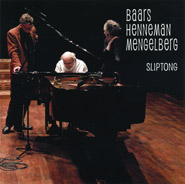
Baars – Henneman – Mengelberg
Sliptong
(Wig)
I have to admit it’s quite unlikely that Chance made the release
of this CD possible just in order to prove my dictum "nowadays there
are no new things anymore" to be wrong. But this is the effect anyway,
in two ways: first, my surprise in listening to a conversation in music
by a trio that I believe to play here for the first time; then, the actual
music played, which easily overcame my tacit fears (it’s not a given that
the combination of
"fine names" and "improvisation" will produce "fine
results"), and which surpassed my (definitely not tiny) expectations.
Watching Sliptong’s cover had me thinking about the last time I listened to
Misha Mengelberg’s piano (and music). My hi-tech database (a big drawer
where artists are placed in alphabetical order) has a CD by The Instant
Composers Pool Orchestra titled Aan & Uit as the most recent Mengelberg-related
item, the fact of it having been released in 2003 making me immediately
aware that there must have been a few episodes I missed; which is entirely
possible, given the fact that this music is as "culturally important" as
it’s "commercially marginal"; I still remember how surprised
I was when I saw in a shop an album by Mengelberg – Solo – that he had
recorded a few years earlier and that I had never heard about.
For quite some time now, Mengelberg has been a
"historical figure", one of those original innovators of the
"Dutch approach" to music which is a precious "unicum" in
our panorama (who’s more deserving than Mengelberg of the
"postmodern" tag? – except for the fact that vagueness of its meaning
makes for a quite useless definition). Ab Baars and Ig Henneman are both
quite original individuals with strong personalities and very clear intentions.
The conversation took place last December in a peaceful but concentrated after
dinner session at Amsterdam’s Bimhuis: a room whose acoustics are well-known
to those three artists, and which for once sits no audience. Kevin Whitehead’s
useful liner notes clearly tell of what happened that night. I’ll quote
a sentence by Ig Henneman (also the album’s producer) which to me sounds
important: "We recorded one hour and then selected 43 minutes. We
hardly edited. This is really how we played it."
Mengelberg’s name necessarily implies
"polystylism", and that’s exactly what happens here. But – and
here I obviously can’t say whether this is a trait that’s specific to this
particular event only – to me it sounded like there was a certain concentration
when it comes to the results, alongside a (relatively speaking!) reduction
of variety and an increased effort in finalizing situations toward the general
direction of "consonance". Mengelberg – well, it’s always easy
to tell it’s him, but this time I found his typical identity more in the
notes he played than in his touch on the piano keyboard; in the liner notes
Whitehead mentions Ran Blake, but I was more reminded of Anthony Davis, especially
when it comes to the case of some higher notes played staccato.
On tenor sax, clarinet, and shakuachi, Ab Baars shows invention and versatility.
Me, I’ll call Ig Henneman as the "brightest note" on the album;
and since the volume of a viola is quite low when compared to the piano’s
and some wind instruments’, listeners are invited to pay a little extra
attention, given the fact that Henneman wisely decided in favour of playing
what was "musically appropriate", not what was
"easy to hear".
The album is well-recorded, the sound being clear, also intelligently placed
in the stereo field.
Leng has a "rhythmic-coordinated" start for viola and tenor sax,
then the piano – listen to the way at about 1′ 20" Ab Baars accepts
a "consonant" invitation by placing a
"hushed" note on Mengelberg’s "bluesy" tonality. Then
it’s long tones, almost "eastern"-sounding, by tenor and viola,
a later part that reminded me of Anthony Davis and Abdul Wadud, solo piano
at the end.
Piano and viola are the main characters in Sliptong, with Henneman’s viola
playing a rhythmic counterpoint while adopting a vocal timbre! Ab Baars’s
shakuachi makes its entrance at about 4′, with a
"breathy" tone that sounds quite "bluesy", almost like
a tenor sax.
Mizu-Iro is openly "ethnic"-sounding, featuring piano, viola, and
shakuachi; while Fishwalk has the tenor sax in an almost "Ayler-lke" mode
and the piano walking along general co-ordinates possessing an "Ellington-Monk" flavour,
both instruments walking in parallel, and an excellent, percussive-sounding
viola.
Maybe the best thing on the album, Zee-Angel is a
"hushed" piece, the viola played arco, a measured piano,
"breathy" tones from the clarinet, piano chords in a chiaroscuro.
Is That Solly? has the viola (playing a "basso continuo"?), piano,
and tenor sax all searching for a certain thematic confluence that somehow
reminded me of Monk, the final result not too distant from "variations
on an unstated theme".
Misha Started Whistling is the kind of track that’s easy to recognize after
just a few notes, with whistling (of course!), a rhythmic piano, the tenor
sax playing overtones.
Clarinet, piano, and viola are featured in the closing track, Oystercatchers,
where Mengelberg’s chords give a definite contexts to Ab Baars’s melodic
phrases.
Beppe Colli
© Beppe Colli 2009
CloudsandClocks.net | July 5, 2009


